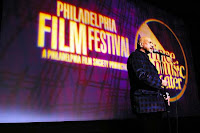This year was shit. Everything that was good had to be fought for because those who swim in the mainstream wouldn't release them. White Material was my only non-back alley endeavor. It played at Ritz Bourse, the small and artier wing of the Ritz theaters, which only those strong enough to engage in Cinematic Soldiery would even venture to.
If they wont expose the cinema, steal it or just make your own.
1. Film Socialism: Histories Du Cinema, In Praise Of Love, and Notre Musique are all encompassed in this film. Literally exact and similar shots and clips are in this one. Godard gave US audiences a difficult time through his subtitles technique. Discussion of oppression, with emphasis on the horrors of the 20th and 21st century
2. Trash Humpers: Very amusing and creative film. On the verge of surrealist absurdism, but stays in an Dogme-esque aesthetic. Hilarious and haunting. Realist, but aware of it and it's levels of intracry yield an interesting product.
3. Uncle Boonmee Who Can Recall His Past Lives: Apichatpong "Joe" Weerasethakul's surreal film about the psychological remnants left from the political situation in Burmese-Thai conflict. Also, a spiritual discussion about the materiality of time and existence. Had buddhist elements I could not understand.
4. Blue Beard: Not as good as Anatomy of Hell, The Last Mistress, etc., this film does beg some difficult questions about the development of myth in the patriarchal trajectory. Yet, Catherine Breillat is one of my favorite directors out and this film shows her strengths as a director.
5. Lourdes: Amazing character portrait from an assistance of Michael Haneke, Jessica Hausner. The film embodies a spirit and an intensity through it's images. The quest the main character goes on his a very human story. The film is beautifully shot, with images that bring the story forth.
6. Face: Tsai Miang-Liang's best to date. An homage to French cinema, Truffuat is his hero and his usage of Jean Pierre Leud shows it. An amazing film about filmmaking, but also the struggle to make art. And the counter tendencies of the personal, life, love and emotion.
7. White Material: A stain of political consciousness wrapped in a film with a unique formal-realist aesthetic.
Mother (With moments of Host and Memories of a Murder, this film created something more interesting than the both. With Bong's crime films, they can take on cliché crime film elements, but this one stuck the protagonists weakness and strengths. Yielded an interesting portrait of that character, but also ending in a very non-cliche way because the director pulls off the character development)
Wild Grass (Much like Resnais's other FNW-esque, but it did have excellent cinematography and art direction)
Dogtooth (Hilarious 'art film' in the vain of Wes Anderson, but more extreme)
Valhalla Rising (Not as good as Bronson, but something of an admixture of Bronson and the Pusher Trilogy. Refn's interest in Masculinity and patriarchal relations shines through in this one)
Carlos (Solid action film, only worth watching if you are annoyingly into politics because it has that definitely going for it)
(I like horror movies, I'm sorry cinema God):



